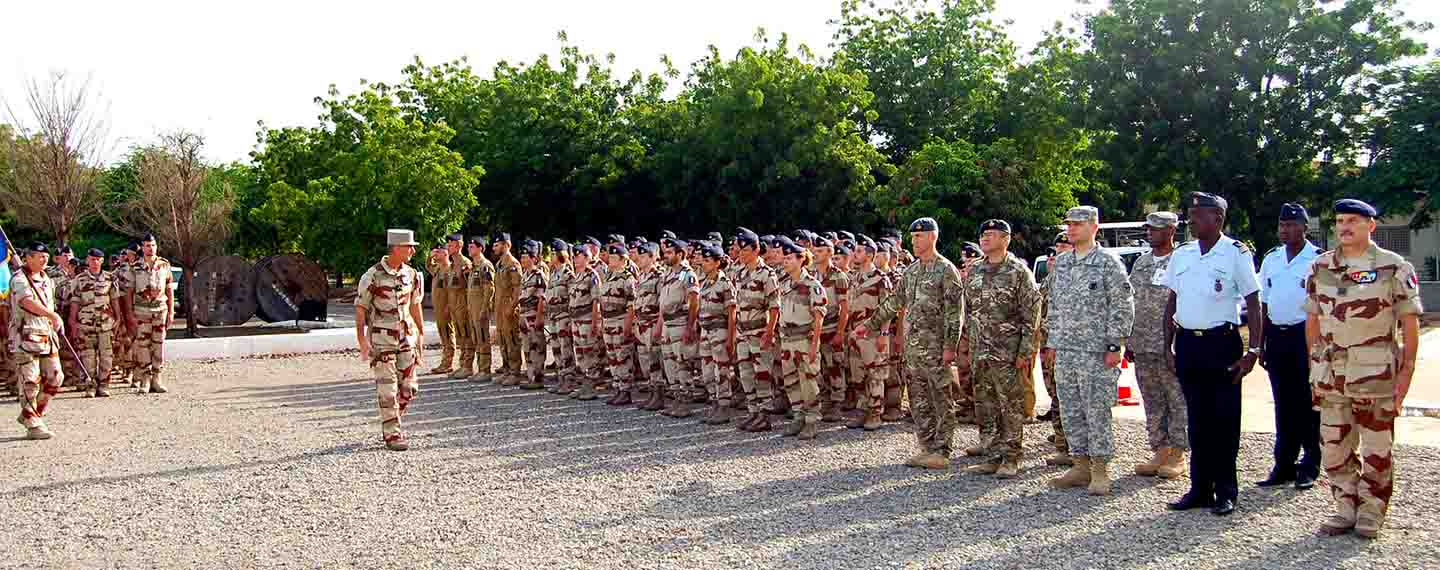On 17 February 2022 President Emmanuel Macron announced the withdrawal of both French and European troops from Mali. Such a statement, which followed a swift breakdown in relations with the Malian ruling junta –that took power after a coup in May 2021– brought France’s nine-year military engagement in the country to a sour end. The communiqué from the Élysée cameat a time when social reactions had been adding further fuel to the scepticism that surrounds Opération Barkhane. In the context of France’s upcoming April elections, such a manoeuvre seems to suggest that French engagement in the Sahel has been careful to avoid being bynamed ‘the French Afghanistan’.
Mali had been the focal point of French counterinsurgency in the Sahel, a 4 million square kilometre belt of land that cuts across Africa’s dessert-savannah divide. The operation had its genesis in 2013 with Opération Serval. It followed Mali’s request to oust the jihadists who took advantage of existing minority grievances by using the Tuareg rebellion as a Trojan horse to conquer the northern territories of Mali. As was the case during the early stages of the War in Afghanistan, Serval proved tactically successful. In 2014 Opération Serval was extended across the region –spreading to Mauritania, Niger, Burkina Faso and Chad– in what came to be known as Opération Barkhane. The latter was projected to last only a few weeks but failed to turn out as planned. Rather than the situation being alleviated, the unfolding of Barkhane has faced mounting casualties, an escalation of the insurgency and dwindling support on the ground and at home.
Rather than the situation being alleviated, the unfolding of Barkhane has faced mounting casualties, an escalation of the insurgency and dwindling support on the ground and at home.
Naomi Moreno-Cosgrove
In recent years French counterterrorist involvement in the Sahel has been experiencing an escalating local opposition, with protests being incited by social media and widespread anger at insecurity. On the one hand, local disenchantment has come to pass given that, contrary to what had been expected, Sahelians have for long witnessed how France has floundered when preventing local army casualties. What’s more, although Barkhane was promoted as ‘taking action for the ultimate benefit of local populations’, the French military have failed to prevent mounting civilian fatalities and widespread population displacement.
The tactical successes of Barkhane –which involve the neutralisation of high-profile jihadists such as Adnan Abu Walid al-Sahraoui, leader of the Islamic State in the Greater Sahara (ISGS), and Abdelmalek Droukel, leader of al-Qaeda in the Islamic Maghreb (AQIM)– have not translated into a success for the mission’s overall strategy and have been overshowed by France’s inability to reduce violent events in the region. Expanding their scope to local quarrels has enabled jihadist groups –namely ISGS and the Group for the Support of Islam and Muslims (JNIM), al-Qaeda’s branch in the region– to consolidate their influence, remobilise and gain resources to bolster their action. Moreover, the upended displacement and humanitarian crisis –accounting for 1.4 million internally displaced persons (IDPs) since 2019– has shown the situation is far from improving. Since 2015 over 23,500 civilians have been killed in Mali, Niger and Burkina Faso, half of which have been reported in the past three years.
Added to the dissonant mutual perceptions that characterised Franco-Malian relations –partly aggravated by Mali’s pro-Russian turn– growing popular anti-French sentiment helped fuel support for the August 2020 and May 2021 coups. The point of no return came about in March 2021 when UN investigators revealed that a French airstrike hit a wedding in central Mali earlier that year and killed 19 civilians. In the broader region, irritation about Barkhane peaked in November 2021 when protesters in northern Burkina Faso and western Niger blocked a large French military supply convoy. In the Nigerien city of Tera, French soldiers fired against protesters to free the convoy, killing three and leaving 18 wounded. Furthermore, following the January 2022 military coup in Ouagadougou, images of the thousands of Burkinabés who took to the streets, with many in the crowd waving Russian flags and holding anti-French banners, no longer come as a surprise.
Such a disillusionment has been combined with a shared perception that a ‘security traffic jam’ has turned the Sahel into an arena of international security actors with conflicting mandates for intervention. Hence, rather than the situation having improved, it has been aggravated. The myriad interventions –from G5 Sahel and MINUSMA to EU training missions and the latest initiative, Task Force Takuba– have further contributed to the jihadist anti-neocolonial rhetoric exploiting existing grievances among populations. Whilst security actors persistently fail to bring stability to the region, international and, in particular, French intervention, continue to be viewed through the mistrustful eyes of a weary population.
Whilst security actors persistently fail to bring stability to the region, international and, in particular, French intervention in the region continue to be viewed through the mistrustful eyes of a fatigued population.
Naomi Moreno-Cosgrove
The February announcement also came at a time when Macron is heading for the first round of presidential elections on 10 April. As with the 2017 campaign –when he conveyed the idea that French external operations should be reduced in scope and translate into larger international efforts–, French public opinion seems to be playing a part in transforming Barkhane. French military operations abroad continue to be seen in the public eye as a guise for covering up undefined interests –such as securing Areva’s uranium in Niger– by collaborating with authoritarian regimes. Furthermore, in a context when more pressing issues seem to take up the geopolitical arena, the congruence between Barkhane’s resources and capabilities has not succeeded in meeting the mission’s yardsticks. The operation has deployed as many as 5,100 troops, 780 military vehicles and some 40 war planes, at a cost of around US$1.2 billion a year. Thereby, in January 2021, for the first time since the mission began in 2013, an Ifop survey showed that a majority –51%– of France’s population were not in favour of French intervention in Mali, with around 19% expressing themselves as ‘strongly opposed’. This contrasts with the 73% in 2013 and the 58% in 2019 that supported France’s military presence in Mali.
Less than a month before standing for re-election, Macron has placed the burden of the blame on Mali’s junta: ‘we cannot remain militarily engaged with de facto authorities whose strategy and hidden objectives we do not share’. Overall, the French electorate and negative inputs from local populations appear to have played a critical role in shaping the course of Opération Barkhane and the future of French counter-terrorist missions in the region. Despite catching most of the attention, the coups in Mali and the ensuing accession to power of Russophiles who are willing to negotiate with the jihadists –those responsible for the deaths of 54 French troops since 2013 and whose targeting is Barkhane’s raison d’être– was not the cause but did underscore that France’s day in Mali is soon to be over.
(…) the French electorate and negative inputs from local populations appear to have played a critical role in shaping the course of Opération Barkhane and the future of French counter-terrorist missions in the region.
Naomi Moreno-Cosgrove
With Wagner, a public-private paramilitary company run within Putin’s oligarchic inner circle, bracing itself to exploit the void left by the French and Task Force Takuba in the Sahel, Macron’s February announcement points to a dynamic whereby governmental decisions in France concerning a region traditionally under its influence have been conditioned by patterns of discontent amongst the French and Sahelian populations.
Image: French and Chad military participate in a flag ceremony to commemorate the launch of Operation Barkhane. Photo: U.S. Army Africa / Chief Warrant Officer 3 Martin S. Bonner (CC BY 2.0)



